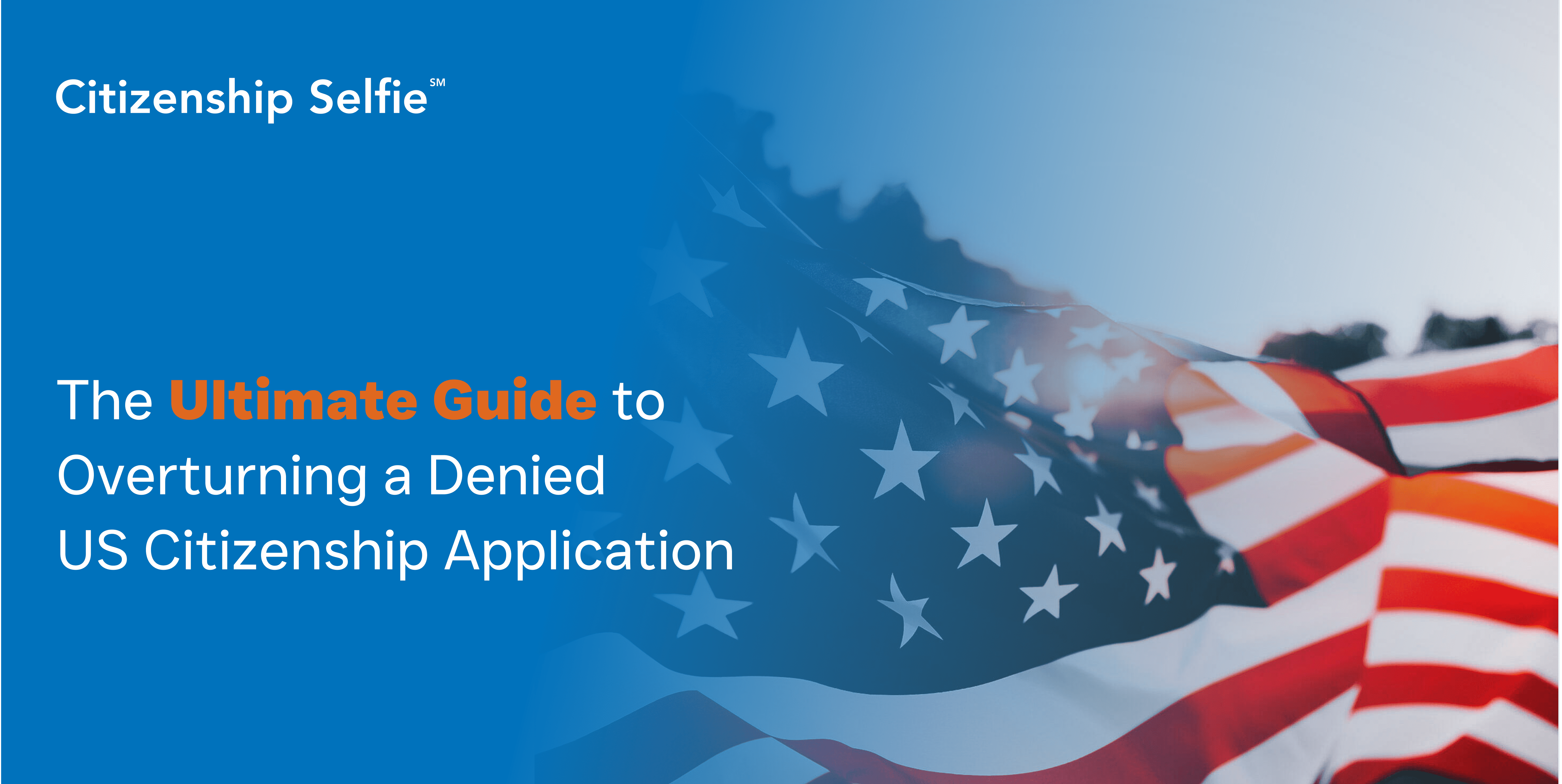One of the most cherished goals for many people is to become a US citizen. Many possibilities open up, including the freedom to travel with a US passport, the ability to vote, and the ability to work for the government. But, for many, becoming a US citizen can be challenging and drawn out because of overturn a denied US Citizenship Application; tragically, some US citizenship applications may even be denied.
It’s important to remember that the road is not over, even though being denied US citizenship can be discouraging.
There are several options to appeal a overturn a denied citizenship in the US. You are entitled to file an appeal if your citizenship application is denied. You can provide proof or justifications for your position during appeals. A motion to reconsider, a hearing request, or a federal lawsuit are alternatives for challenging a denial of citizenship in the US. It is crucial to speak with a knowledgeable immigration lawyer to discuss your alternatives and guarantee the best result for your case. Learn how to overturn a denied US citizenship application: gather evidence, draft an appeal letter, navigate the appeals process. With the right strategy and approach, getting citizenship in the US is possible despite being denied.
Understanding the Reasons for Overturn a Denied US Citizenship Application
One of the first steps in Overturn a denied US citizenship application is to understand the reasons for the denial. Application rejections include several common grounds, including:
Failure to meet residency requirements – To be eligible for US citizenship, candidates must have maintained a physical presence in the US for at least five years.
Criminal history – Applicants with certain criminal backgrounds may be denied US citizenship, depending on the seriousness of the offense.
Failure to meet English language or civics requirements – Applicants for US citizenship must demonstrate a certain level of language competence and a fundamental knowledge of US history and government.
Failure to uphold high moral character standards – Applicants must display exceptional moral character, which may be questioned in light of particular actions or behaviors.
According to recent statistics, top reasons for overturn a US citizenship denial are residency criteria and moral character.. For instance, in the fiscal year 2020, USCIS turned down 17% of citizenship applications because of residence issues and 10% of citizenship applications due to issues with moral character.
Understanding the grounds for the application’s denial is crucial to crafting a successful appeal. If an applicant was denied due to a criminal record, they can submit evidence of rehabilitation and positive behavior post-conviction. By addressing the specific grounds for the denial, the applicant can better address USCIS‘s concerns and make a stronger case for reversing the refusal.
Gathering Evidence
When your application for Overturn a US citizenship is denied, gathering sufficient evidence to support your appeal is vital. If an applicant can provide more evidence, their case will be stronger. Here are some guidelines for the kind of evidence to compile:
Proof of moral character – Applicants should collect evidence of their moral character, such as awards, volunteer work, or notable achievements, to strengthen their application.
Presentation of proof of rehabilitation or repentance efforts might be helpful if a criminal conviction was given as the reason for refusal.
Affidavits are written declarations made under oath by witnesses who can attest to a candidate’s moral character, behavior, or actions. They are often clear indicators of moral rectitude.
Letters of recommendation from trusted sources like employers, authorities, or religious leaders can validate moral integrity in an application.
It’s important to remember that the type of proof needed will change based on why the request was denied. If residency requirement was the issue, proof of physical presence in the US may be required. The amount of proof a candidate can gather always improves their chances of having their appeal accepted.
To defend an appeal overturn a denied US citizenship application, strong evidence must be gathered. Examples of evidence supporting citizenship eligibility include affidavits, recommendation letters, moral character declarations, and rehabilitation records.
Crafting an Appeal Letter
A letter of appeal must accompany every appeal for overturn a denied US citizenship application. The letter should be compelling and persuasive enough to persuade USCIS that the applicant merits American citizenship. Here is a list of everything you should include in the letter, in order:
Include in the appeal letter whether the denial was brought on by a failure to meet the residency requirements, a criminal record, or another issue. The applicant’s approaches to the issue and justifications for believing they meet the requirements for US citizenship should be explained in the letter.
The appeal letter should emphasize the applicant’s good qualities, such as their contributions to the community, employment history, and personal characteristics. This can be used to prove that they are morally upright and deserving of US citizenship.
Express enthusiasm for the opportunity to appeal – The letter should express gratitude for the opportunity to appeal and acknowledge the importance of US citizenship.
Be brief and precise – The letter must be clear and easy to understand. Avoid using a formal tone or unnecessary technical jargon.
The letter should mention supporting material, such as affidavits, letters of recommendation, and other proof of the applicant’s great character. This can back up the candidate’s assertion and demonstrate their eligibility for citizenship in the United States.
Navigating the Appeals Process
A protracted and difficult appeals process may be necessary for overturn a denied US citizenship application. There are various stages, so knowing what to expect is essential. The following is a guide to navigating the appeals process:
The first stage of an appeal is an administrative appeal. The first stage of the appeal is an administrative appeal to USCIS. Applicants must submit Form N-336, Request for a Hearing on a Decision in Naturalization Process. A hearing will be scheduled with the applicant to review the case after an immigration official has given the appeal some thought. The applicant may present justifications and evidence at the hearing to support their appeal.
Judicial Review, the second level of appeal, is available if the administrative appeal is turned down. The applicant must file a case with a federal district court to do so. If USCIS denied the application arbitrarily or capriciously, the court would review the case to make that determination.
Tips for Navigating the Appeals Process
Pursuing an appeal with tenacity and patience is essential because the appeals process may take months or even years.
Gather credible evidence: As said, the appeal must be backed up by credible evidence. Gather as much evidence as possible to demonstrate your US citizenship eligibility.
You can better grasp the appeals process and make sure your case is well-presented by hiring a knowledgeable immigration attorney.
Be prepared to provide a compelling case if the appeal calls for a hearing. Improve your ability to present the facts and your case succinctly.
Get organized: Keep track of all paperwork and papers about appeals. This will guarantee nothing is forgotten and enable the appeal to go without incident.
The appeals procedure may be challenging, but with patience, forethought, and the right backing, it is possible to reverse a denied US citizenship application.
Conclusion
Denied US citizenship can be demoralizing, but it’s not the end. To overturn a denied US citizenship application, analyze the denial reasons, gather evidence, appeal effectively, and navigate the process.
Common reasons for denial include not meeting residency requirements, having poor moral character, speaking English poorly, and not understanding American civics. To overturn a decision, applicants must present convincing evidence, such as affidavits, letters of recommendation, and declarations of moral character.
Writing a compelling appeal letter that addresses the reasons for denial, highlights merits, and shows gratitude for the opportunity to appeal is crucial. Finally, while navigating the appeals process might be challenging, becoming a US citizen with persistence, forethought, and the right help is possible.
Remember that the experience of a denied US citizenship application does not spell the end of the world. With the proper supporting paperwork, appeal letter, and strategy, it is possible to overturn a denied US citizenship application.






